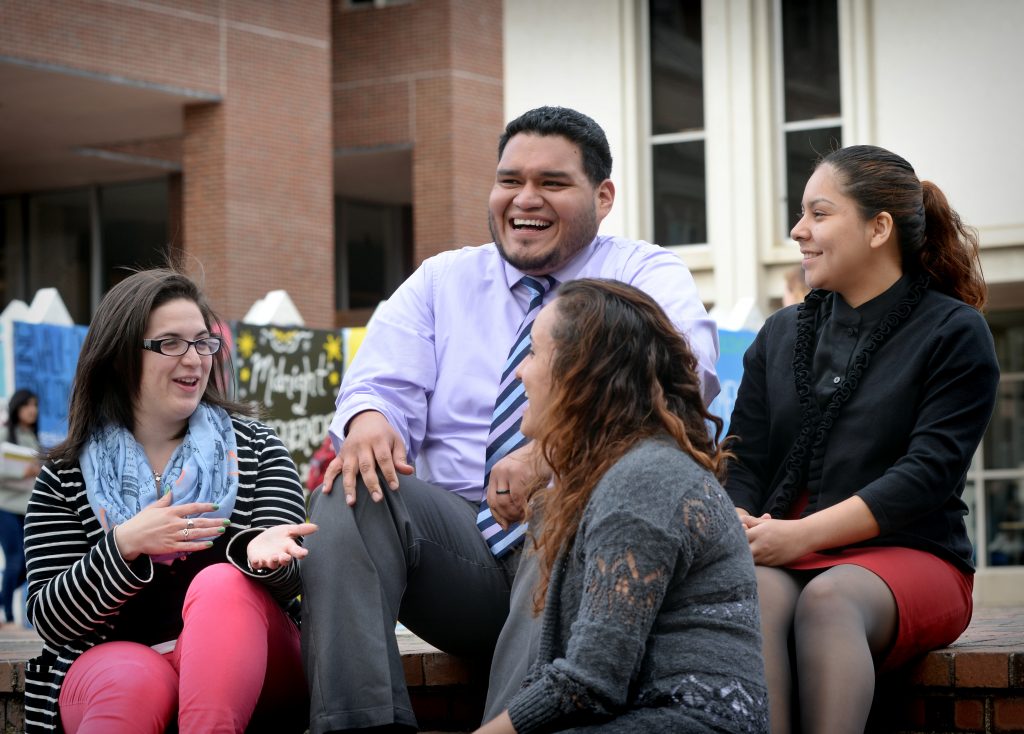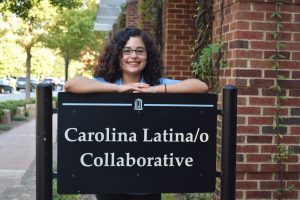
By Laurie D. Willis ’86
Josmell Perez came to Carolina in 2007 to work as a recruiter for underrepresented students. Back then he said being Latino on campus wasn’t well defined.
“It was very binary, either black or white,” said Perez, who’s Peruvian. “The climate for Latino students was more of, ‘there’s The Sonja Haynes Stone Center for Black Culture and History and the American Indian Center, but where do we identify. Where’s our home away from home?’ ”
Fortunately for the University’s Latino students, the Carolina Latinx Collaborative (CLC) now operates out of a shared seminar space in Craige North.
“Given today’s political climate, having a space that denotes a group’s identity is transformative, not only for that specific group but also for others to recognize their existence,” said Perez, who earned a master’s in education from UNC in 2012 and serves as CLC director. “I’ve heard people say they don’t see race, or that they’re color-blind. I think, instead, we should see it and we should celebrate it.”

Ana Gomez ’18 is a first-generation college student from Durham, North Carolina, majoring in biology and minoring in chemistry and Spanish. She works as a student director for the CLC, organized the first Latinx Family Weekend during the spring 2018 semester and agrees with Perez that all ethnicities should be celebrated.
“I’ve wanted to have an event like this for a while because in many cases there’s a language barrier that exists between the families of the student and the people on campus,” she said. “Many families are wary about coming to campus or may feel embarrassed because they don’t speak English. I know how important family is to the Latinx community, and I wanted a bilingual space where the families could see everything a student does at UNC.”
Gomez said the Carolina Latinx Collaborative has had a tremendous impact on her.
“While working at CLC I’ve learned skills that are invaluable to the workforce,” she said. “For example, I wasn’t very good at sending emails. Although that may sound small, how you communicate with different groups of people can impact the relationships you build. I’m now officially an email expert because of all the different types of emails I’ve had to send. Also, it showed me how many more resources are needed for minority development.”
Gomez said working at the CLC has empowered her. “During my first two years I’ll admit I felt lost in the sense that I didn’t know how I was going to leave my mark at Carolina,” she said. “Working at the CLC has helped me define my place on campus.”
Gomez’s words are confirmation to Perez that the CLC is accomplishing some of its goals, including creating a sense of community among Latino students, working with undergraduates on programs celebrating their identity, fostering a greater awareness of their ancestry and establishing programming that allows them to be successful.
“When I arrived at Carolina there was a University-run mentoring program for all incoming African-American and American Indian students, but once again Latino students were left out,” Perez said. “What about us? We also struggle with the transition. So I and other student group leaders took it upon ourselves to create that mentoring program. We also organized the campus-wide celebration of Latinx Heritage Month held Sept. 15 to Oct. 15 each year.”
While Perez said the CLC has been successful, he acknowledges more must be done.
“There’s a sign in the ground that denotes the CLC, so I think that’s a huge win,” he said. “There are students that have come in and don’t know a Carolina that didn’t have a mentoring program for them or that doesn’t promote their identity. To me success is trying to make each student’s experience a positive one. In my humble opinion, I think we’re having a great impact.”
Gomez agrees, citing movie night, Latin nights and other cultural events that help students find their niche. However, she said the CLC needs more University-suppported employees.
“A lot of us are students and our priority is to be students,” she said. “We want to help out as much as we can, but there are some things that would be a lot easier with professional help.”
Perez says he thinks the University will get there — slowly but surely.
“We were actually the first institution in the southeast to create a space acknowledging Latino students,” he said. “Since then, UNC-Wilmington has created a space. Do I wish we’d done certain things earlier? Yes. Do I wish there wasn’t a need to fight for certain recognitions? Of course. But I tend to be more of a person that looks at the future and how we move forward.”

